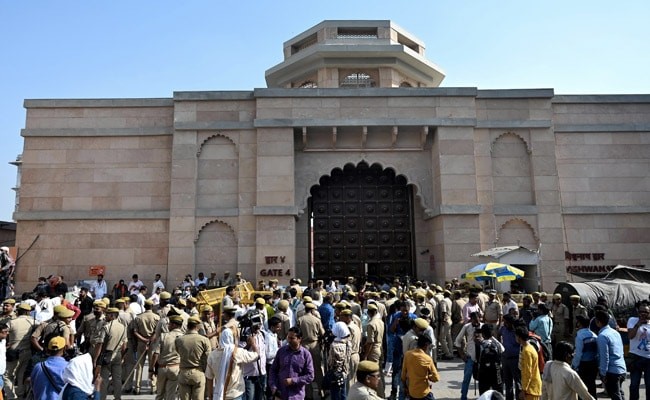
Petitioners claim Shivling found in Gyanvapi masjid pond; court seals off area

A Varanasi court on Monday (May 16) ordered the closure of the pond area in Gyanvapi Masjid complex after the petitioners claimed to have found a Shivling.
The Shivling or relic of Shiva was allegedly found on the last day of the court-mandated filming of the mosque complex. This filming was done after a petition was filed seeking access to pray at a shrine behind the mosque.
The lawyer, Subhash Nandan Chaturvedi, representing the group of Hindu women who are fighting to gain access to the shrine, told the media that the Shivling was found after water was drained from the pond.
The petitioners had requested that the court should close off the pond after this discovery of the Shivling. The pond is used for the Islamic ‘Wuzu’ or purification rituals.
The court accepted the plea and ordered the Varanasi district magistrate to ensure that the pond is not used, for now.
A district magistrate, the police chief and a top Central Reserve Police Force (CRPF) officer would also ensure no one can enter the sealed area. However, Varanasi district magistrate Kaushal Raj Sharma failed to mention the “discovery of shivling” during his interaction with media persons, said news reports.
Instead, Sharma had said that no details of the survey of Gyanvapi mosque were disclosed by any member of the commission. “The court is the custodian of the information about the survey,” he said.
Also read: Explained: The legal tangle over Varanasi’s Gyanvapi mosque
The Gyanvapi mosque is located close to the iconic Kashi Vishwanath temple. The five women petitioners had asked the court to allow daily prayers before idols on its outer walls as well as other “visible and invisible deities within the old temple complex”.
A video assessment of the mosque complex was ordered by the Varanasi Civil Court. The filming included that of the three domes, underground basements and the pond. A court commissioner was also appointed to oversee the filming.
This survey took off on May 6 but had to be discontinued after a dispute broke out over filming inside the mosque. The mosque committee said the court had not ordered videography inside the mosque.
The court-ordered filming was challenged before Allahabad High Court, which dismissed the case in April but the high court order was challenged in the Supreme Court.
A lawyer representing the Gyanvapi Mosque trust that approached the Supreme Court against the filming order said it is at odds with the Places of Worship Act, 1991. The Supreme Court refused to stop the filming but agreed to consider listing the plea against the survey of the mosque complex.


